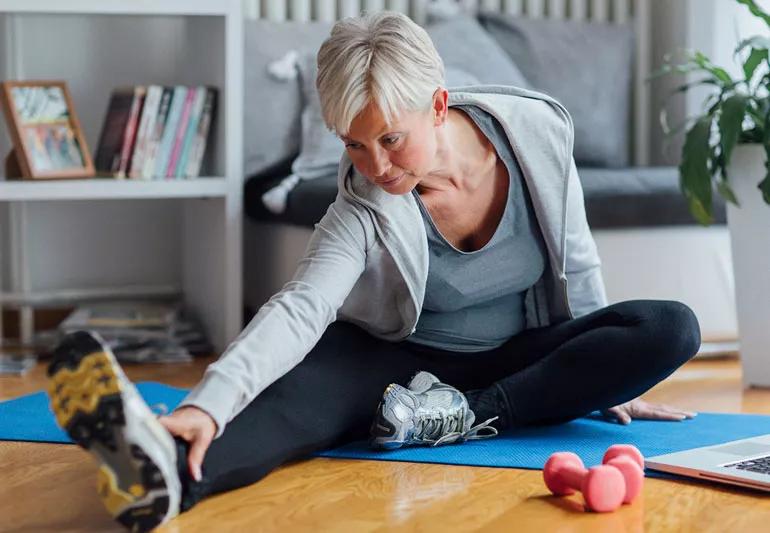These first-line treatments may do the trick

Image content: This image is available to view online.
View image online (https://assets.clevelandclinic.org/transform/1e6ea633-9312-4274-bc9c-1ed17c95ea2c/painInterstitialCystitis-491701736-770x553_jpg)
Woman stretches and exercises to control pain from Interstitial Cystitis
When you have interstitial cystitis (IC), a painful bladder syndrome, every bathroom trip is stressful.
Advertisement
Cleveland Clinic is a non-profit academic medical center. Advertising on our site helps support our mission. We do not endorse non-Cleveland Clinic products or services. Policy
“Whether you’re newly diagnosed or have been living with IC for longer than you’d care to think about, you can take steps to get relief,” says urologist Howard Goldman, MD. “There’s no one approach that works for everyone with IC, so try these things alone and in combination to see what works best for you.”
If you’ve already advanced the treatment ladder to more aggressive treatments, you may still want to try these five measures for greater relief.
Certain foods may trigger IC:
“Don’t try to eliminate everything at once,” says Dr. Goldman. “Stop something for a week or two, then reintroduce it if you didn’t notice any changes in your symptoms. A week or two later, stop something else. Use trial and error to determine what your triggers are.”
While it’s generally a good idea to drink plenty of water, not everyone with IC agrees: “Some people find that when they drink less, they have fewer painful trips to the bathroom ,” says Dr. Goldman. “However, others find that drinking more water decreases the concentration of the urine and makes it less painful.” Check with your doctor before cutting your water intake too much.”
Advertisement
“Many patients with painful bladder syndrome also have trigger points or tight muscles in the pelvic area. They may wonder if the tightness causes the IC or if the IC causes the tightness,” says Dr. Goldman.
“Try to maintain a moderate activity level because that’s important for general health,” he advises. “If muscle tightness causes IC, then you might find relief through stretching and exercise.”
Dr. Goldman recommends seeing a physical therapist (PT) with experience treating pelvic pain. Your PT can massage tight areas and teach you how to relax pelvic muscles. You can then practice those relaxation exercises regularly.
“Pelvic floor physical therapy can help loosen the tight muscles that are related to IC pain,” says Dr. Goldman. “If you’ve sworn off sex because, well, pain isn’t so sensual, then PT might even get you back to an active sex life.”
IC pain can be psychologically devastating and debilitating — pain is stressful. That stress can manifest itself in tight muscles and a bleak outlook.
“Research shows that stress causes heightened pain sensitivity,” says Dr. Goldman. “If you’re in pain, you get stressed, which leads to more pain. It’s a vicious cycle.”
Dr. Goldman recommends stress reduction activities like yoga, meditation and massage. A counseling session is another great way to help you wrap your head around living with chronic bladder pain.
Dr. Goldman advises hitting the drugstore to help control bladder pain. His top recommendations are:
Advertisement

Sign up for our Health Essentials emails for expert guidance on nutrition, fitness, sleep, skin care and more.
Learn more about our editorial process.
Advertisement
An overactive bladder, UTI, kidney stones or an enlarged prostate can affect how you urinate
Advice to help you go with the flow
The short answer from a women’s health practitioner
You may be surprised to learn that acupuncture usually doesn’t feel like anything — and any discomfort is typically brief
Gallstones can block bile in your biliary system and lead to pain and discomfort
This chronic condition most commonly causes pelvic pain and severe cramping during periods, but it can bring other types of pain symptoms, too
Your knees could be hurting at bedtime because of inflammation, injury or some other condition that gets worse with pressure and positioning
Looking down at your smartphone or computer screen can stress muscles in your neck, shoulders and back
Although it could be used as a moisturizer, this new trend is not recommended
Communicating clear limits helps protect your time, energy and emotional well-being
High cholesterol can be genetic, but testing and treatment can lower your heart disease risk